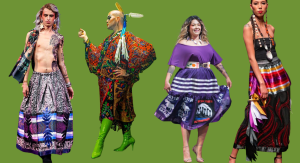At Apocalypse, we *love* clothes. Seriously love ’em. We can look at and talk about clothing all day long! But, too often these days, the clothes we love are taking a toll on the planet and on the people. Fast fashion grants accessibility to trendy clothing to a wider range of people, but cheaper materials and labor means less longevity of the items and poor working conditions for factory workers.
On the other hand, sustainable fashion is notoriously expensive, and not necessarily the answer to solving the climate crisis. So what’s the middle ground? Of course, we’re big fans of clothing resale as a solution to balancing our love for fashion with our respect for the planet and her people. Today, we’re talking about resale’s funky sibling: DIY!



DIY, or do-it-yourself, is the trend that we’ve been seeing a lot lately – especially throughout quarantine. People are making, altering, and otherwise upcycling clothing, quilts, towels etc. Craft elements have been seen everywhere from entrepreneurial DIY-ers on Depop (such as Ella Emhoff, Kamala Harris’s stepdaughter) to the RTW runways this spring (a la Marni, below).
DIY allows individuals to put their own spin on a specific trend or item, while also prolonging the longevity of existing clothing or repurposing old textiles — so it’s a great way to show off some of your personal style *and* do your part for the planet!

In the long confines of quarantine, crafting has surged in popularity (maybe you’ve done some DIY-ing yourself in the past year). People had lots of time on their hands, limited budgets, and brain-numbing boredom that had to be absolved! For example, Dana, of Instagram brand Sunworn Vintage, started her business of upcycling vintage towels into clothing after losing her job due to COVID.
DIY is also likely borne out of cottagecore, an aesthetic influenced by Romanticism and the arts and crafts movement. While cottagecore was popular before quarantine (see: the rise of Batsheva), being forced to stay at home allowed people to further lean into their idyllic home-making fantasies. Cottagecore can be thought of as a pushback against mass consumerism, in that the focus is on making your own products, whether that’s clothes or food. In this sense, cottagecore and DIY share the same heart: self-reliance, expression, and environmental awareness.




So… what do you think? Is there a place for DIY in your closet? (The answer is most likely yes!)






